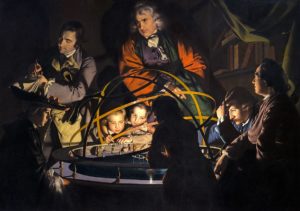 Our title asks a rather uncomfortable question. But it’s also an important question for every adult to face… for young adults and even teenagers to face: For what would you risk a certain or near-certain death?
Our title asks a rather uncomfortable question. But it’s also an important question for every adult to face… for young adults and even teenagers to face: For what would you risk a certain or near-certain death?
It is by answering such a question that we define ourselves as more than “intelligent meat machines.” Answering the question in any positive way defines us as deep beings… as transcendent beings.
This question, then, is a sort of pivot, upon which turn our beliefs about ourselves and our expressions of ourselves – and this on a very deep level.
Does Answering The Question Involve Reason?
This is another interesting question: Is dying for the sake of something else rational at all? Rabbi Heschel thought it wasn’t:
Nobody can rationally explain why he should sacrifice his life and his happiness for the sake of the good. The conviction that I must obey the ethical imperatives is not derived from logical argument but originates from an intuitive certitude, in a certitude of faith.
There have been attempts to find a third option, that of instinct. We choose to die, the argument goes, for people who share our DNA: that we will if it preserves enough of our DNA. So, somehow our instincts know this and drive us (again irrationally) to sacrifice ourselves.
There are even a few examples of this alternative in the natural world. Those examples, however, involve microbes, aphids and ants. These are creatures who first of all lack reason, and who are far removed from humanity in many other ways.
My feeling is that the “save the DNA” model is serves mainly those people who are committed to the “selfish gene” theory… a starkly deterministic (“meat machines”) theory. And it’s probably fitting to include a thought from Erich Hoffer on determinists:
There is an element of misanthropy in all determinists. To all of them man as he really is is a nuisance, and they strive to prove by various means that there is no such thing as human nature.
At the end of this all, however, we still left to face the question: Who or what would we be willing to die for?
Would we die to save the life of our children? Would we die to preserve the life of our spouse? The lives of our parents? Our siblings? Someone else?
Would we die to preserve human freedom? Would we die to preserve the accumulated knowledge of the world? For the truth of God? For something else?
Getting Practical
This is a demanding question, I know. So, let’s take a moment to address it in a very practical way. And we can begin with this:
If you could save the entire human race by flying your spaceship into an evil alien spaceship that was about to vaporize our entire planet, would you do it?
Most people, I dare say, would say yes to this question. I happen to think this is a very good thing, but it’s only a start. So, if you could say “yes” to that question, I’ll ask you to do this as well:
Take some time to imagine doing it. See it slowly and in detail… live it. What would you think about? Who would you try to send a message to? What would you say?
In my opinion, this may be one of the more important exercises you ever undertake. So please, linger over it. Run it in your mind as you fall off to sleep.
Then, once you’ve done this repeatedly… once you’ve worn it out… think about lesser scenarios: Would you do it to save half the world? A quarter? Would you do it for your child? For a dear friend?
In The End…
In the end, Heschel was right, and this isn’t essentially rational. Rather, it comes from our depths.
Being willing to give up our very lives, we judge ourselves as being larger than our lives. Somehow, and in some way, we accept that good calls to the good, that life calls to life. These things make us, by our own, internal structures and convictions, transcendent beings.
We can’t prove these things, but that doesn’t mean they are false; it means only that they are not measurable items.
In the end, far more of our lives involve faith than we’ve understood. As the rabbi also noted,
Man’s true fulfillment depends on communion with that which transcends him.
If you could imagine the spaceship scenario, and feel okay about it, you’ve put yourself into Rabbi Heschel’s model.
And for a practical confirmation, here’s a telling passage from war reporter Chris Hedges:
In the end, those who rebel require faith — not a formal or necessarily Christian, Jewish or Muslim orthodoxy, but a faith that the good draws to it the good. That we are called to carry out the good insofar as we can determine what the good is.
So, please, consider our question carefully: For whom or what would you be willing to die? A great deal turns upon it.
**
Paul Rosenberg
freemansperspective.com
